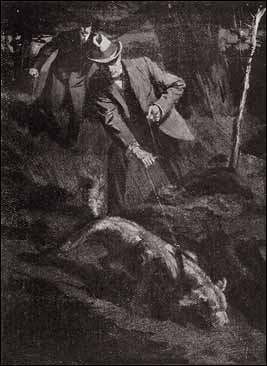| The Episode of the Barrel 4 | The Episode of the Barrel 5 |
“They are hellish things,” said he. “Look out that you don’t prick yourself. I’m delighted to have them, for the chances are that they are all he has. There is the less fear of you or me finding one in our skin before long. I would sooner face a Martini bullet, myself. Are you game for a six-mile trudge, Watson?”
“Certainly,” I answered.
“Your leg will stand it?”
“Oh, yes.”
“Here you are, doggy! Good old Toby! Smell it, Toby, smell it!” He pushed the creosote handkerchief under the dog’s nose, while the creature stood with its fluffy legs separated, and with a most comical cock to its head, like a connoisseur sniffing the bouquet of a famous vintage. Holmes then threw the handkerchief to a distance, fastened a stout cord to the mongrel’s collar, and led him to the foot of the water-barrel. The creature instantly broke into a succession of high, tremulous yelps and, with his nose on the ground and his tail in the air, pattered off upon the trail at a pace which strained his leash and kept us at the top of our speed.

The east had been gradually whitening, and we could now see some distance in the cold gray light. The square, massive house, with its black, empty windows and high, bare walls, towered up, sad and forlorn, behind us. Our course led right across the grounds, in and out among the trenches and pits with which they were scarred and intersected. The whole place, with its scattered dirt-heaps and ill-grown shrubs, had a blighted, ill-omened look which harmonized with the black tragedy which hung over it.
On reaching the boundary wall Toby ran along, whining eagerly, underneath its shadow, and stopped finally in a corner screened by a young beech. Where the two walls joined, several bricks had been loosened, and the crevices left were worn down and rounded upon the lower side, as though they had frequently been used as a ladder. Holmes clambered up, and taking the dog from me he dropped it over upon the other side.
“There’s the print of Wooden-leg’s hand,” he remarked as I mounted up beside him. “You see the slight smudge of blood upon the white plaster. What a lucky thing it is that we have had no very heavy rain since yesterday! The scent will lie upon the road in spite of their eight-and-twenty hours’ start.”
I confess that I had my doubts myself when I reflected upon the great traffic which had passed along the London road in the interval. My fears were soon appeased, however. Toby never hesitated or swerved but waddled on in his peculiar rolling fashion. Clearly the pungent smell of the creosote rose high above all other contending scents.
“Do not imagine,” said Holmes, “that I depend for my success in this case upon the mere chance of one of these fellows having put his foot in the chemical. I have knowledge now which would enable me to trace them in many different ways. This, however, is the readiest, and, since fortune has put it into our hands, I should be culpable if I neglected it. It has, however, prevented the case from becoming the pretty little intellectual problem which it at one time promised to be. There might have been some credit to be gained out of it but for this too palpable clue.”
“There is credit, and to spare,” said I. “I assure you, Holmes, that I marvel at the means by which you obtain your results in this case even more than I did in the Jefferson Hope murder. The thing seems to me to be deeper and more inexplicable. How, for example, could you describe with such confidence the wooden-legged man?”
“Pshaw, my dear boy! it was simplicity itself. I don’t wish to be theatrical. It is all patent and above-board. Two officers who are in command of a convict-guard learn an important secret as to buried treasure. A map is drawn for them by an Englishman named Jonathan Small. You remember that we saw the name upon the chart in Captain Morstan’s possession. He had signed it in behalf of himself and his associates – the sign of the four, as he somewhat dramatically called it. Aided by this chart, the officers – or one of them – gets the treasure and brings it to England, leaving, we will suppose, some condition under which he received it unfulfilled. Now, then, why did not Jonathan Small get the treasure himself? The answer is obvious. The chart is dated at a time when Morstan was brought into close association with convicts. Jonathan Small did not get the treasure because he and his associates were themselves convicts and could not get away.”
“But this is mere speculation,” said I.
| The Episode of the Barrel 4 | The Episode of the Barrel 5 |